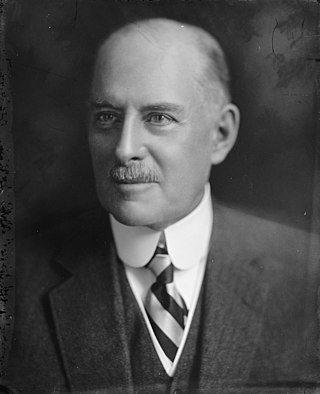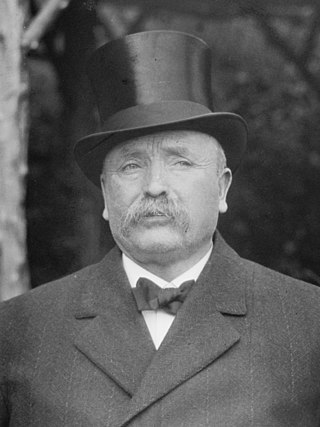Related Research Articles

Leadville is a statutory city that is the county seat, the most populous community, and the only incorporated municipality in Lake County, Colorado, United States. The city population was 2,633 at the 2020 census. It is situated at an elevation of 10,119 feet (3,084 m). Leadville is the highest incorporated city in the United States and is surrounded by two of the tallest peaks in the state.

The Western Federation of Miners (WFM) was a labor union that gained a reputation for militancy in the mines of the western United States and British Columbia. Its efforts to organize both hard rock miners and smelter workers brought it into sharp conflicts – and often pitched battles – with both employers and governmental authorities. One of the most dramatic of these struggles occurred in the Cripple Creek district of Colorado in 1903–1904; the conflicts were thus dubbed the Colorado Labor Wars. The WFM also played a key role in the founding of the Industrial Workers of the World in 1905 but left that organization several years later.

James Hamilton Peabody was the 13th and 15th Governor of Colorado, and is noted by some for his public service in Cañon City and by others for his brutality in crushing the miners' strike in Cripple Creek in 1903–04.

James Benton Grant was an American mining magnate, mining engineer, Confederate Army soldier who served as the third Governor of Colorado from 1883 to 1885.

Davis Hanson Waite was an American politician. He was a member of the Populist Party, and he served as the eighth Governor of Colorado from 1893 to 1895.

James Joseph "J.J." Brown, was an American mining engineer, inventor, and self-made member of fashionable society. His wife was RMS Titanic survivor Margaret Brown.

Samuel Danford Nicholson was a United States senator from Colorado.

Edward Boyce was president of the Western Federation of Miners, a radical American labor organizer, socialist and hard rock mine owner.

The Cripple Creek miners' strike of 1894 was a five-month strike by the Western Federation of Miners (WFM) in Cripple Creek, Colorado, United States. It resulted in a victory for the union and was followed in 1903 by the Colorado Labor Wars. It is notable for being the only time in United States history when a state militia was called out in support of striking workers.
Henry Dunning Moore was a Whig member of the U.S. House of Representatives from Pennsylvania.

Jesse Fuller McDonald was an American public official, civil engineer and surveyor, who served as the 16th governor of Colorado from 1905 to 1907.

Edward Thomas Taylor was an American lawyer and educator who served as a U.S. Representative from Colorado. A member of the Democratic Party, he served 17 terms in the U.S. House, from 1909 to 1941.

George Washington Cook was a U.S. Representative from Colorado. At eleven years of age, he ran away from home to serve during the Civil War. He was a drummer boy and then a chief regimental clerk. After the war, he completed his public school education and then attended Indiana University. His varied career included working for railroad and mining companies, and service as a mayor and a legislator. He was department commander for the Grand Army of the Republic.
Silver mining in Colorado has taken place since the 1860s. In the past, Colorado called itself the Silver State.

Stephen R. Fitzgarrald was the 17th Lieutenant Governor of Colorado, serving from 1909 to 1915 serving under Governors John F. Shafroth and Elias M. Ammons as a member of the Democratic party.
The Leadville miners' strike was a labor action by the Cloud City Miners' Union, which was the Leadville, Colorado local of the Western Federation of Miners (WFM), against those silver mines paying less than $3.00 per day. The strike lasted from 19 June 1896 to 9 March 1897, and resulted in a major defeat for the union, largely due to the unified opposition of the mine owners. The failure of the strike caused the WFM to leave the American Federation of Labor (AFL), and is regarded as a cause for the WFM turn toward revolutionary socialism.

Temple Israel is a former synagogue, now Jewish history museum, located at 201 West 4th Street in Leadville, Colorado, in the United States. The former synagogue was erected during the summer of 1884 in less than two months. The Temple Israel building is a rare example of a frontier synagogue.
The Colorado State League was an unaffiliated minor league baseball league that played between 1885 and 1898 involving teams from Colorado.Notable participants included the Leadville Blues, who were members of the league in multiple seasons, such as 1885, 1889, and 1898. The league disbanded after the 1898 season, with Aspen’s team folding mid-season despite leading the standings.
The Leadville Blues were a minor league baseball team based in Leadville, Colorado. Between 1885 and 1898, Leadville teams played as members of the 1885 Colorado State League, 1886 Western League and Colorado State League in 1889, 1896 and 1898. The 1896 team was known as the Leadville "Angels." The Blues and Angels hosted minor league home games at the Leadville Base Ball Grounds.
